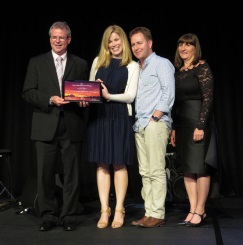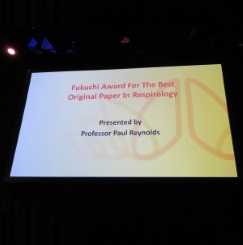Sarah Jefferies
APSR 2018 Fukuchi Award winner for the paper Randomized controlled trial of the effect of regular paracetamol on influenza infection
Sarah Jefferies, Irene Braithwaite, Steven Walker, Mark Weatherall, Lance Jennings, Michelle Luck, Kevin Barrett, Robert Siebers, Timothy Blackmore, Richard Beasley, Kyle Perrin, On behalf of the Pi Study Group DOI: 10.1111/resp.12685

I had the pleasure of attending the 22nd Congress of the Asian Pacific Society of Respirology in November at the spectacular International Convention Centre in Sydney's glistening Darling Harbour. The congress was packed with an array of international speakers and poster presentations delivered over four days. It included a Gala Dinner where I was very honoured to receive, on behalf of my Wellington-based (New Zealand) research team, the 2017 Fukuchi Award for the best original paper in Respirology.
The opening ceremony and symposium set the tone for me, beginning with acknowledgement of the traditional, indigenous custodians of the land, the Cadigal people of the Eora nation, and featuring the Mt Druitt Indigenous Choir. The symposium then introduced a number of topics under the congress theme of 'Lung Health in a Changing World'. It highlighted some critical global public health issues, and I sought to follow these and related topics through the congress; in particular, the transboundary and intergenerational health impacts of our changing environment; the potential benefits and pitfalls of scientific innovation on respiratory health; and our ongoing battles with endemic, emerging and re-emerging infectious disease threats, including antimicrobial resistance.
Our windows of opportunity to prevent the worst effects of global environmental changes, including climate change and outdoor air pollution, are being increasingly well defined through international research. Dr Urs Frey opened the symposium reviewing the evidence for associations between perinatal exposures to air pollution and pulmonary health in childhood and adulthood. Dr Bin Jalaludin highlighted global inequities in the distribution and health impacts of air pollution. As is true with climate change, atmospheric particulate pollution knows no political boundary, particularly affects our most vulnerable populations, and should be all of our concern. Another congress highlight for me was a fascinating talk on Melbourne's 2016 thunderstorm asthma event by Dr Bruce Thompson, describing the unexpectedly devastating impact of a triad of thunderstorm, high pollen count and a densely packed, sensitized, atopic population.
Numerous scientific innovations were discussed at the congress: from new medical diagnostics to the Big Tobacco-produced disruptive technologies, e-cigarettes, which may help and/or hinder health goals. It was great to see Dr Charles Yu's presentation on the utility of modelling tools to assess the impact of new technologies; in this case, TB diagnostics.
Finally, I was interested to see the use of whole genome sequencing in various settings, including tracking the molecular evolution of infectious diseases and antimicrobial resistance in the Asia-Pacific region.
In addition to providing new knowledge, the congress re-enforced for me the importance of collaborative, international and interdisciplinary research, and our role as health professionals and researchers, as well as members of our global and local communities, to find effective ways to translate evidence into policy action. As a public health physician and infectious diseases researcher, I hope to build on the messages of this congress, and work to develop collaborative interdisciplinary relationships to contribute to addressing the complex challenges of our rapidly changing world.
With thanks to the generous support of the APSR to attend the congress,

